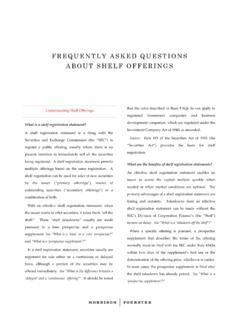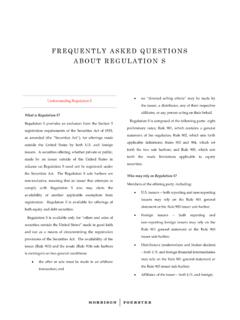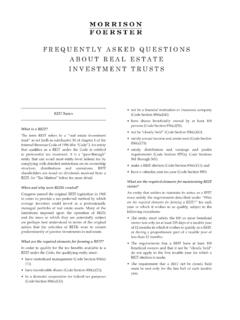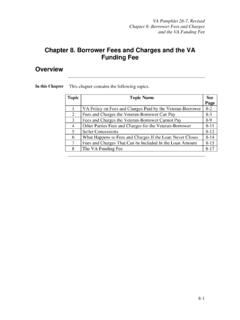Transcription of Frequently Asked Questiosn about Foreign Private Issuers
1 102 Morrison & Foerster LLP Capital MarketsGeneralWhat are some benefits of becoming a public company in the United States? Foreign companies realize a number of benefits by being a public company in the united States. These benefits include: increased visibility and prestige; ready access to the capital markets, which arestill the largest and most liquid in the world; an enhanced ability to attract and retain keyemployees by offering them a share in thecompany s growth and success through equity-based compensation structures; and the ability to send credible signals to the marketthat the company will protect minority , even with the renewed vigor of capitalmarkets in the united States and to a lesser extent, globally, all companies face substantial obstacles to accessing capital in the united States.
2 Even if a Foreign company is able to raise capital publicly in the united States, becoming and remaining a public company is an expensive, time-consuming project that may require Foreign companies to reorganize their operations and corporate governance in ways that such companies would not necessarily choose absent is a Foreign issuer ?The federal securities laws define a Foreign issuer as any issuer that is a Foreign government, a Foreign national of any Foreign country, or a corporation or other organization incorporated or organized under the laws of any Foreign country. Source: See Rule 405 ( Rule 405 ) of the Securities Act of 1933, as amended (the Securities Act ), and Rule 3b-4(b) of the Securities exchange Act of 1934, as amended (the exchange Act ).
3 What is a Foreign Private issuer ?A Foreign Private issuer ( FPI ) is any Foreign issuer (other than a Foreign government), unless: more than 50% of the issuer s outstanding votingsecurities are held directly or indirectly of record byresidents of the united States; and any of the following applies: the majority of the issuer s executive officers or directors are citizens or residents; mor e than 50% of the issuer s assets are located in the united States; or the issuer s business is administered principally in the united States. A Foreign company that obtains FPI status can avail itself of the benefits of FPI status immediately. Source: Rule 405 under the Securities Act and Rule 3b-4(c) ( Rule 3b-4(c) ) under the exchange is the percentage of an FPI s outstanding voting securities calculated for purposes of determining whether 50% or more are held of record by residents?
4 Methodology for Calculating Voting Securities. Securities held of record by a broker, dealer, bank, or nominee for the accounts of customers residing in the united States are counted as held in the united States by the number of separate accounts for which the securities are held. In addition, a Foreign issuer also must treat as owned of record by residents any shares reported as beneficially owned by a resident in a Frequently Asked QUESTIONSABOUT Foreign Private ISSUERS2filing made under Section 13(d) of the exchange Act or any comparable reporting provision of another country. This method of calculating record ownership differs from the method a domestic issuer is permitted to use in its determination of the number of record owners for purposes of Section 12(g) of the exchange Act, which counts only record owners and not beneficial owners holding securities in street name.
5 Source: Rule 12g3-2(a) under the exchange Foreign issuer that maintains multiple voting classes may use one of two methods to determine whether more than 50% of its voting stock is held by residents by assessing: (1) whether 50% of the voting power of those classes on a combined basis is directly or indirectly owned of record by residents of the united States; or (2) the number of voting securities. While the Securities and exchange Commission s (the SeC ) Division of Corporation Finance (the SeC Staff ) has not expressed a preference for either methodology, it has affirmed that a Foreign issuer must apply a determination methodology on a consistent basis.
6 Source: Securities Act Rules C&DIs, Question no. ; exchange Act Rules C&DIs, Question no. Evaluating Residency. While a person who has permanent resident status ( , a Green Card holder) is presumed to be a resident, the SeC Staff has explained that individuals without permanent resident status may also be deemed residents (for purposes of Rule 405 and Rule 3b-4(c)) based on the following criteria: tax residency; nationality; mailing address; physical presence; the location of a significant portion of the person sfinancial and legal relationships; or immigration the SeC Staff has not mandated use of any one of these criteria, it has asserted that a Foreign issuer must nevertheless decide which criteria it will use to determine residency and apply them consistently.
7 Source: Securities Act Rules C&DIs, Question no. ; exchange Act Rules C&DIs, Question no. can a Foreign issuer assess whether its executive officers or directors are citizens or residents?For purposes of determining whether a majority of a Foreign issuer s executive officers or directors are residents or citizens under Rule 405 and Rule 3b-4(c), the SeC Staff has clarified that the calculation must be made separately for each of its directors and officers. Accordingly, a Foreign issuer must make the following four determinations under Rule 405 and Rule 3b-4(c): the citizenship status of its executive officers; the residency status of its executive officers; the citizenship status of its directors; and the residency status of its the case of a Foreign issuer that maintains two boards of directors, the Foreign issuer must make the majority analysis with respect to the board of directors that performs functions that most closely resemble those undertaken by a board of directors.
8 If such functions are allocated to both boards, then the Foreign issuer may aggregate the members of both boards for purposes of the calculation. Source: Securities Act Rules C&DIs, Question nos. and ; exchange Act Rules C&DIs, Question nos. and can a Foreign issuer determine whether a majority of its assets are located in the United States?To determine whether more than 50% of a Foreign issuer s assets are located in the united States, the SeC Staff has clarified that a Foreign issuer may either: use the geographic segment information determinedin the preparation of its financial statements; or apply on a consistent basis any other reasonablemethodology in assessing the location and amountof its : Securities Act Rules C&DIs, Question ; exchange Act Rules C&DIs, Question no.
9 Can a Foreign issuer determine whether its business is administered principally in the United States?There is no particular factor that is determinative for evaluating whether a Foreign issuer s business is administered principally in the united States under Rule 405 and Rule 3b-4(c). Instead, a Foreign issuer must assess on a consolidated basis the location from which its officers, partners or managers primarily direct, control and coordinate its activities. For example, absent any other factors, an issuer that holds an annual (or special) meeting of its shareholders or occasional meetings of its board of directors in the united States would not be deemed to be administering its business principally in the united : Securities Act Rules C&DIs, Question 1043 Morrison & Foerster LLP Capital Marketsnos.
10 And ; exchange Act Rules C&DIs, Question nos. and often must a Foreign issuer review its status as an FPI?An FPI must determine its status on the last business day of its most recently completed second fiscal quarter. If an FPI no longer satisfies the FPI requirements, it will become subject to domestic reporting requirements on the first day of its fiscal year immediately succeeding such determination. This allows an FPI about six months advance notice to prepare the necessary materials to comply with these domestic reporting requirements. Source: Rule 3b-4(c) under the exchange Act. Can an FPI qualify as an emerging growth company?















